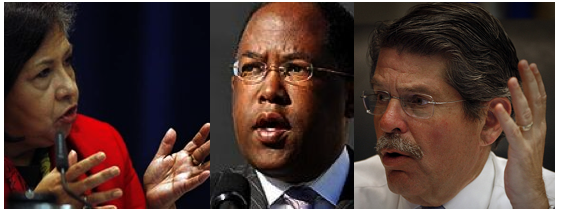BOUNDARY BATTLE-As a member of the Board of Supervisors since 1994, I’ve had the privilege and responsibility of representing nearly 2 million people woven together in a district that encompasses the Westside, the San Fernando Valley and the Las Virgenes region—all in the virtual shadow of the Santa Monica Mountains.
The residents of the Third District share more than a cohesive geography. Although ethnically diverse, they share common government services, transportation, environmental interests and much more.
Now, all this is being placed in serious jeopardy by a bald-faced gerrymander that is completely unnecessary. Proponents claim it’s needed to comply with the law, but that just isn’t so.
Like the state and federal governments, counties must redraw their district boundaries every ten years to conform to the results of the U.S. Census. But unlike the recently completed state and federal efforts, which were performed by citizens’ panels, the county’s redistricting must be decided by the Board of Supervisors.
As part of this process, two proposed maps (denoted as T1 and S2) were submitted this week that would radically redraw the Board of Supervisors’ district boundaries, leaving communities fragmented and an estimated 3.5 million people suddenly represented by a supervisor for whom they never cast a vote. Worse, some of these same people would be denied the right to vote for a supervisor for as long as six years because of the timing of elections.
The scope of the fallout would be vast and swift, potentially undermining the ability of communities to speak with one voice as advocates for their common interests. For example, the San Fernando Valley, which has fought hard to maintain its own identity, would be carved into three different districts. Hollywood and mid-Wilshire, meanwhile, could be included in a district with such distant cities as Lomita and Cerritos.
(Here are the current district boundaries. Click here for the T1 plan and here for the S2 plan.)
As you know, I’m currently in my final term as a supervisor so I have no personal interest in the electoral composition of the districts—even if it means that, for my term’s duration, I would no longer represent communities I’ve been honored to serve for nearly two decades.
However, I’m utterly convinced that these redistricting schemes would significantly injure our ability to fight together to improve transportation in our communities, keep a close watch on development issues, extend health care to our underserved population and protect the environment of the Santa Monica Mountains and the north Santa Monica Bay.
The county’s redistricting plan must adhere to the Federal Voting Rights Act, a bulwark of the civil rights movement in our country and a guarantor of democracy for all Americans. The Voting Rights Act protects the rights of designated minorities to an equal opportunity to elect candidates of their choosing. Both of the proposed maps create two districts in which Latinos would comprise more than half the voting-age citizens, instead of one such district now.
But contrary to the arguments put forward by supporters of the proposed maps, their adoption is not required by this law. The Voting Rights Act requires an equal opportunity for minority groups; it does not require the creation of districts in which a single minority group comprises more than 50% of the voting age citizenry. The Federal courts have ruled that “fifty percent” districts are only required when voting is so racially polarized that non-minorities consistently vote against minority-preferred candidates to such an extent that those candidates are denied an equal opportunity to win.
Frankly, the notion that non-minorities won’t vote for a minority candidate in LA County is antiquated. Los Angeles in 2011 is not the same as the Los Angeles of forty, thirty or even twenty years ago. Our county is politically and socially far more mature and broad-minded.
In the last decade, many elections have been won by Latino candidates even where Latinos did not represent a majority of the voters. These candidates include Mayor Antonio Villaraigosa, Sheriff Lee Baca and County Assessor John Noguez.
I strongly believe that it is possible to redistrict this county in a manner that protects the voting rights of minorities without dismembering established communities of interest, without shifting nearly 40% of our population from one district to another, and without relying on antiquated assumptions about the voting behavior of different segments of the electorate.
The federal courts have given us the roadmap to get this done, and have consistently rejected efforts to use the Voting Rights Act in the way the backers of these new plans propose.
The Board of Supervisors will hold a hearing on the proposed redistricting plans on Tuesday, September 6, at 1:00 pm in Room 381 of the downtown Kenneth Hahn Hall of Administration, 500 W. Temple St. I urge you to attend and make your voice heard on this crucial issue for our community. If you’re unable to attend, I ask that you communicate your concerns to the board members by writing or e-mailing.
(Zev Yaroslavsky is Los Angeles County Supervisor for the Third District. He can be reached at zev.lacounty.gov) -cw
Tags: Board of Supervisors, Los Angeles County, redistricting, county redistricting, US Census, district boundaries, San Fernando Valley, Los Angeles, Mayor Antonio Villaraigosa, Sheriff Lee Baca, minorities, Voter Rights
CityWatch
Vol 9 Issue 67
Pub: Aug 23, 2011




